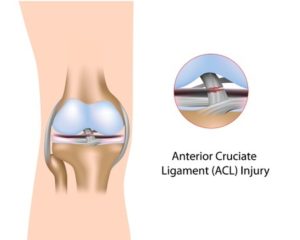Knee Injuries – ACL Tear Injury
Knee Injuries – ACL Tear Injury
Information About ACL Tear Injuries
Brockton Personal Injury Attorneys
 The anterior cruciate ligament, or ACL, is found inside the knee joint. The ACL is one of the ligaments that help form the knee joint by connecting the femur bone to the shinbone bone. In addition to holding these bones together, the ACL provides support by stabilizing the knee. An ACL tear destabilizes the entire knee.
The anterior cruciate ligament, or ACL, is found inside the knee joint. The ACL is one of the ligaments that help form the knee joint by connecting the femur bone to the shinbone bone. In addition to holding these bones together, the ACL provides support by stabilizing the knee. An ACL tear destabilizes the entire knee.
ACL tears are one of the most common knee injuries. ACLs are susceptible to tears when they are subjected to quick or intense twisting. These types of movements subject the ACL to tremendous stress which causes tears or strains. An ACL can either tear, rupture or sprain.
A sprain is not as serious as a tear or a rupture. A sprain occurs when the ligament is overstretched resulting in damage to the collagen fibers which, in turn, results in localized inflammation. A tear is less serious than a rupture and patients will find that they can put some pressure on a knee with a torn ACL. An ACL rupture on the other hand is very serious. An ACL rupture is basically a complete tear. Anyone with a ruptured ACL likely wont be able to walk. Partial tears are rare as most ACL injuries are complete tears.
What causes an ACL tear?
The ACL is injured in several ways:
- Rapid changes in direction
- Sudden stops
- Slowing down while running
- Jumping and landing awkwardly
- Direct impact from a collision
Symptoms
- “Popping” noise followed by knee giving out;
- Pain, inflammation and swelling. Knee will begin to swell within 24 hours;
- Decrease and loss of range of motion;
- Tenderness around the knee joint;
- Pain and discomfort when walking.
Diagnosis
Anyone suffering an ACL tear will immediately know something is wrong with their knee. A popping noise indicates that the tendon has torn. This popping noise is usually followed by inflammation, pain, and loss of knee stability. These symptoms are clearly indicative of a serious problem and that is why most people with ACL tears know to seek medical treatment right away.
The doctor will perform a physical examination on the knee to determine if there is a strain, tear, or rupture. The patient will be sent for an MRI which will pinpoint the extent of the injury. X-Rays may also be ordered to determine if the femur or tibia sustained a fracture.
Treatment
Some sort of therapy is always required. Surgical invention is also usually required, especially in the case of a ruptures or tears. Sprains usually don’t require surgery.
An ACL will not repair itself if it has been torn. However, some patients might not have surgery. Elderly people usually forgoe surgery and opt instead for therapy. Anyone opting for therapy without surgery is looking at several weeks or months of knee instability and physical therapy. The purpose of physical therapy is to build up the muscles around the torn tendon in order to take pressure off the torn tendon and help provide additional stability to the knee.
A torn ACL ligament can be reconnected with reconstructive surgery. A tendon graft can be performed by taking excess tendons from the patients quad or hamstring muscle and using it to reconnect the torn ACL ligament. A patient who has surgery is looking at several weeks of physical therapy in order to regain strength and flexibility in the knee. The recovery period is anywhere from 4 to 6 months.
Our Accident Victims Claims Attorneys Can Help You Recover Lost Wages And Medical Costs For Your Injuries
If you suffered an ACL tear in an accident through no fault of your own, you may be entitled to compensation for medical expenses and lost wages. No matter where you are located, we are just a phone call away to help you understand your rights and the value of your claim.
Call our Boston Car Accident Lawyers to schedule a free no-obligation case review and consultation at (508) 588-0422 and you will have taken your first step towards getting fair compensation for your injuries.
Our knowledgeable and experienced Boston Personal Injury Attorneys assist accident victims throughout all of Southeast Massachusetts, including but not limited to Brockton, Taunton, Bridgewater, Weymouth, Hingham, Hanover, Duxbury, Whitman, Middleborough, Raynham, Quincy, Plymouth, Marshfield, Attleboro, Braintree, Rockland, Mansfield, Avon, Canton, Stoughton and all smaller cities and rural areas in Southern Massachusetts. We also serve the counties of Plymouth, Norfolk, Bristol, Massachusetts.
